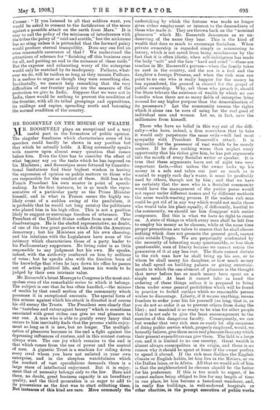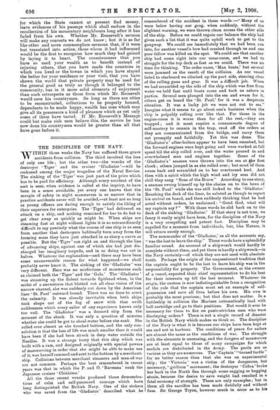M.R. ROOSEVELT ON THE MISUSE OF WEALTH.
1VIR. ROOSEVELT plays an exceptional and a very useful part in the formation of public opinion. The singular fraukness which characterises some of his speeches could hardly be shown in any position but that which he actually holds. A King necessarily speaks with reserve upon almost every question that comes before him. Even the Czar has to consider the effect of what hcomay say on the tasks which he has imposed on his Ministers ; and Sovereigns more fettered by Constitu- tional limitations find their highest wisdom in leaving the expression of opinion on public matters to those who are responsible for the conduct of them. Still less is the French President his own master in point of speech- making. In the first instance, he is as much the repre- sentative of a particular party as the Prime Minister himself, and in what in France seems the highly un- likely event of a sudden swing of the pendulum, it is probable that he would not long outstay the politicians who placed him in his high office. This is not a position likely to suggest or encourage freedom of utterance. The President of the United States suffers from none of these disadvantages. He is the elected representative, no doubt, of one of the two great parties which divide the American democracy ; but his Ministers are of his own choosing, and his relations with the Legislature have none of the intimacy which characterises those of a party leader to his Parliamentary supporters. No living ruler is so little responsible to any judgment but his own. He speaks, indeed, with the authority conferred on him by millions of votes; but he speaks also with the freedom born of the knowledge that when he lays down his office he passes out of active political life, and leaves his words to be judged by their own intrinsic value.
Mr. Roosevelt's latest Message to Congress is the most out- spoken even of the remarkable series to which it belongs. The subject is one that he has often handled,—the misuse of wealth by that small section of the community which possesses it in exceptional amounts. The special form of this misuse against which his attack is directed is of course his old enemy the Trusts. The President sees clearly that the "tasteless and extravagant luxury" which is sometimes associated with great riches can give no real pleasure to any one. A man who is able to gratify every fancy that occurs to him inevitably finds that the process yields enjoy- ment so long as it is new, but no longer. The multipli- cation of pleasures becomes in the end a fight against the depressing influences of custom, and in this contest custom always wins. The one joy which remains to the end is that which comes from the use of power and the control of men. A gigantic Trust is a machine for riding down every rival whom you have not enlisted in your own enterprise, and in the sleepless watchfulness which the conduct of vast speculations demands there is a large store of intellectual enjoyment. But it is enjoy- ment that of necessity belongs only to the few. Here and there, no doubt, great business capacity is an hereditary quality, and the third generation is as eager to add to its possessions as the first was to start collecting them. But instances of this kind are rare. More commonly the undertaking by which the fortune was made no longer gives either employment or interest to the descendants of those who made it. They are thrown back on the "nominal . pleasures" which Mr. Roosevelt denounces as so un- deserving of the name they bear. This is the kind of wealth that does so much to encourage Socialism. When private ownership is regarded simply as ministering to luxury, which is not saved from being mischievous by the fact that it is often idiotic, when self-indulgence has made the body "soft" and the face "hard and cruel "—these are touches in Mr. Roosevelt's picture—when the family takes no root in the country, and the son is a fool and the daughter a foreign Princess, and when the rich man can point to no one who is really happier for the money he has squandered, the ground is cleared for the gospel of public ownership. Why, ask those who preach it, should the State tolerate the existence of wealth by which no one benefits when there are so many fields of enterprise lying unused for any higher purpose than the demoralisation of its possessors ? Let the community resume the rights which it alone can be sure of using for the real good of individual men and women. Let us, in fact, save the millionaire from himself.
Those who have no belief in this way out of the diffi- culty—who have, indeed, a firm conviction that to take it would only perpetuate the same evils—will feel most - sympathy with President Roosevelt's attack. It is impossible for the possessor of vast wealth to be merely useless. If he does nothing worse than neglect every opportunity that his riches give him, he has put arguments into the mouth of every Socialist writer or speaker. It is true that these arguments leave out of sight two very important facts,—that unless the owner locks up his money in a safe and takes out just so much as is wanted to supply each day's waste, it must be profitably used by others, though not by him ; and that we have no certainty that the men who in a Socialist community would have the management of the public purse would not repeat under different names and by different methods the same wealth-wasting process. If the useless rich man could be got rid of in any way which would not make those who would take his place equally, if differently, hurtful to the community, we should see him disappear with entire . composure. But this is what we have no right to count . on. A state of things in which every man shall be left free to employ his money as he chooses, while at the same time proper precautions are taken to ensure that he shall choose nothing which does not promote the general good, cannot exist outside Utopia. We are perpetually confronted by the necessity of tolerating many questionable, or lesS than questionable, uses of liberty because we cannot retain the possession of it at any less cost. The State cannot dictate to the rich man how be shall bring up his son, or to whom he shall marry his daughter, or how much money he shall spend on building palaces or giving entertain- ments in which the one element of pleasure is the thought that never before has so much money been spent on a single meal. At least it cannot take in hand the ordering of these things unless it is prepared to bring them under some general prohibition which will be found in practice to forbid outlays which no reasonable person wishes to discourage. Liberty, if it means anything, means freedom to order your life for yourself (so long, that is, as you do not so order it as to prevent others from doing the • like) ; and mankind is so ready to be wise for.other.people • that it is not safe to give the least encouragement to the exercise of this dangerous faculty. Consequently, we can but wonder that very rich men so easily let slip occasions of doing public service which, properly employed, would, we honestly believe, give them more real pleasure than any which their present expenditure can give them. The field is a large one, and it is limited to no one country. Great wealth is almost always cosmopolitan in its origin, and there is no reason why it should be spent at home if the owuer prefers to spend it abroad. If the rich man dislikes the English climate or English habits, let him live in the Riviera, or on the Italian lakes, or in Africa. All that we would ask of him is that the neighbourhood he chooses sheuld be the better for his preference. If this is too much to expect, if he cannot endure being obliged to live for any length of time in one place, let him become a beneficent wanderer, and, in really fine buildings, in well-endowed hospitals or other charities, in the prompt execution of public works for which the State cannot at present find money, leave evidences of his passage which shall endure in the recollection of his momentary neighbours long after it has faded from his own. Whether Mr. Roosevelt's sermon will make any converts we do not know ; but it is so far like other and more commonplace sermons that, if it were but translated into action, those whom it had influenced would be the first to recognise how much they had gained by laying it to heart. The consciousness that you have so used your wealth as to benefit instead of injuring others, that you have made the countries in which you lived or the towns in which you have stayed- the better for your residence or your visit, that you have shown the world that private property may be used for the general good as truly as though it belonged to the community, has in it more solid elements of enjoyment than such retrospects as those from which Mr. Roosevelt would save his countrymen. So long as there are cities to be reconstructed, collections to be properly housed, dependents to be made happy, wealth has uses which may give all its possessors a kind of pleasure which as yet only some of them have tasted. If Mr. Roosevelt's Message could but make rich men believe this, the service he has now done his countrymen would be greater than all that have gone before it.









































 Previous page
Previous page